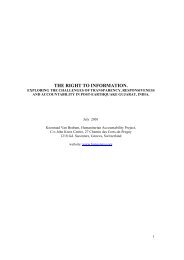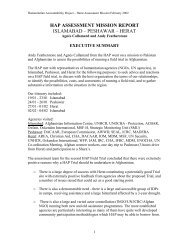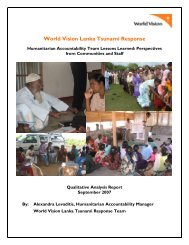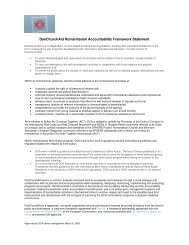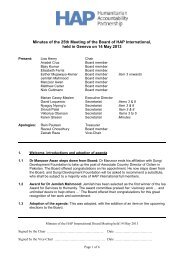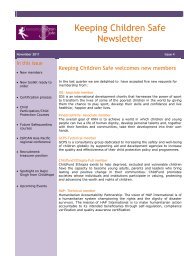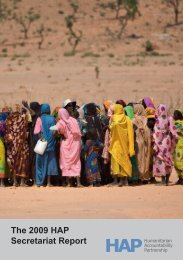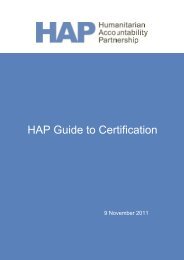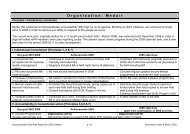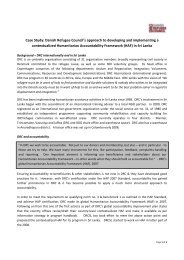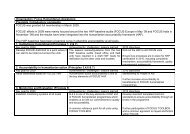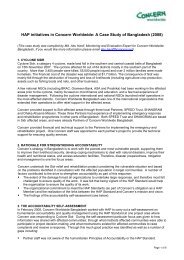Chapter Four - HAP International
Chapter Four - HAP International
Chapter Four - HAP International
You also want an ePaper? Increase the reach of your titles
YUMPU automatically turns print PDFs into web optimized ePapers that Google loves.
The 2008 Humanitarian Accountability Report<br />
19. Tearfund UK<br />
• Clarity<br />
Tearfund’s Liberia team learned the importance of being clear in advance (though illustrations, more detailed Memorandums of Understanding (MoUs) with<br />
a community, etc) about what they would provide, so communities could hold them to account, and also specifying the role/input expected from the<br />
community, so that a clear two-way relationship was established.<br />
• Community literacy<br />
Local languages were spoken not written, so printed public information had to be in English. In every community there were those who read English and<br />
could translate for others, but the printed material was not sufficiently concise/pictorial to reach as many as possible. This is an area for future development:<br />
notice board information should be developed in collaboration and trialled with different sectors of the community, ensuring the most vulnerable have access<br />
to information.<br />
• Further benefits of Beneficiary Accountability<br />
When properly empowered, it was found that the community and its leadership helped to curb fraud, whether by staff or community members e.g. when a<br />
community wrongly received snacks instead of meals during a workshop, or materials going missing from deliveries—detailed community MoUs and stock<br />
ledgers brought in through beneficiary accountability helped to ensure that staff were better stewards of the resources entrusted to Tearfund for<br />
communities, and that community leaders were also held accountable.<br />
Plans with regard to: undertaking a baseline analysis, a certification audit, or mid term certification review<br />
The mid-term monitoring audit is scheduled for December 2009<br />
20. The Women’s Refugee Commission<br />
1. Institutional Commitment (Principles 1, 2 & 7)<br />
The Women’s Refugee Commission, formerly the Women’s Commission for Refugee Women and Children, continued to make progress on integrating<br />
accountability guidance into its work on behalf of women, children and adolescents affected by armed conflict and persecution. Over the past year, the<br />
organisation finalised a working draft of an accountability handbook that now includes a section on research methodologies and guidelines for conducting<br />
focus group discussions (FGD) and key informant interviews.<br />
In mid-2008, the Women’s Refugee Commission decided to undertake a baseline analysis against the <strong>HAP</strong> Standard to further guide the organisation to<br />
improve its accountability and quality management systems. In late 2008, staff worked with <strong>HAP</strong> to establish the terms of reference and to organise the<br />
January 2009 baseline analysis. In preparation for the baseline analysis, the Women’s Refugee Commission identified and submitted documents specific to<br />
<strong>HAP</strong> principles, benchmarks and other requirements.<br />
2. Accountability in humanitarian action (Principles 3,4,6 & 7)<br />
To ensure accountability to displaced populations, the Women’s Refugee Commission routinely includes the voices of displaced populations in its field<br />
research. Staff document findings and advocate recommendations through reports, letters, meetings, presentations and media outlets, to target audiences<br />
119<br />
144




